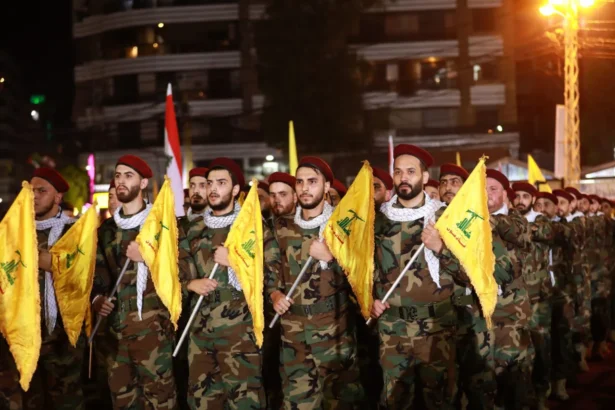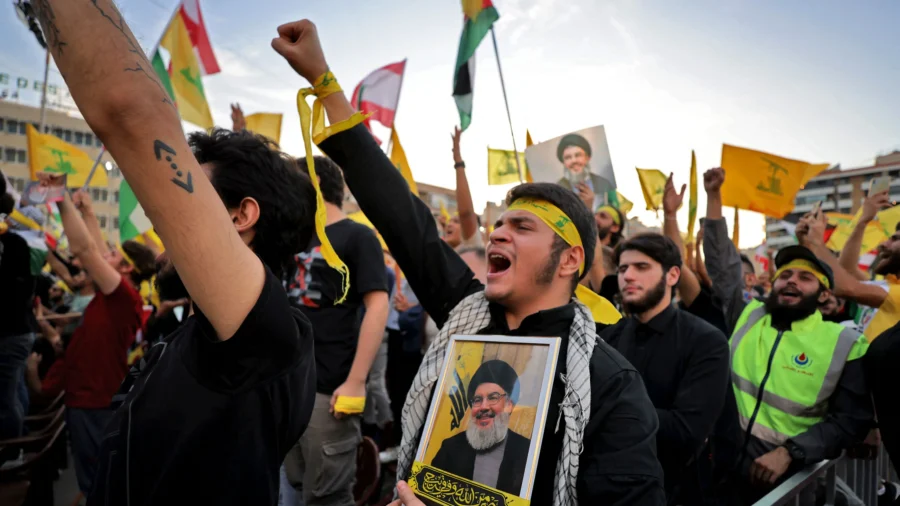Speaking to the BBC in Beirut, Sheikh Naim Qassem, the second in command of Hezbollah, warned of regional war if Israel continues its bombing of Hamas operations in Gaza that has killed many Hamas terrorists but also sadly Gazan civilians.
“The danger is real,” Mr. Qassem said, “because Israel is increasing its aggression against civilians and killing more women and children. Is it possible for this to continue and increase, without bringing real danger to the region? I think not.”
“Very serious and very dangerous developments could occur in the region, and no-one would be able to stop the repercussions,” Mr. Qassam told the BBC in an interview on Wednesday.
“Every possibility has a response,” he said, in the wake of claims by the Hamas-run health ministry in Gaza that Israel’s bombings had claimed more than 10,000 lives—including that of 4,000 children.
Throughout the interview, Mr. Qassam portrayed Hezbollah—the Iranian-backed Shia Islamist group designated a terrorist organization by the United States, United Kingdom and the Arab League—as a defensive organization, even though the elimination of Israel has been one of the group’s primary goals since its inception.
Mr. Qassem claimed that Israel “initiated the aggression against Gaza in a hideous way.”
When the reporter noted that it was in fact Hamas that first attacked Israel on Oct. 7, the sheikh replied that the attacks were an inevitable response to what many Palestinians describe as an “Israeli occupation.” He then repeated the unfounded claim spread by Hamas-sympathizers that the Israeli civilians who died during the attack where shot by Israeli forces.
When prodded about bodycam footage of the attacks shared by the responsible Hamas terrorists on social media, Mr. Qassem parried the question. “Why don’t we look at what Israel has done inside Gaza,” he said. “They kill civilians and demolish homes.”
He praised the Hamas attacks on Israel, calling them “a great result for the Palestinian resistance.” When asked about the reported 10,000 Gazans who died as a result of the Israeli counteroffensive, he seemed to considered it an advantageous matter.
“The massacres committed by Israel are mobilizing the Palestinians more and more to cling to their land,” he replied.

Hezbollah was founded by Iran’s Revolutionary Guards in 1982 during the Lebanese civil war, after which it has maintained close ties with the Iranian Islamist regime. Hezbollah’s militia, which is the strongest political force in Lebanon, has an estimated 60,000 fighters, including special forces, regular soldiers, and reserves, with a stockpile of 150,000 rockets and missiles.
Nicholas Blanford, a Beirut-based defense and security consultant, told the BBC that a conflict with Hezbollah will “make what’s happening in Gaza look like a walk in the park.”
“Israel will be in lockdown for the duration of the conflict. Most of its population will have to remain in bomb shelters,” he said. “There would be no civil aviation or maritime traffic. Hezbollah’s larger guided missiles could hit military targets across the country.”
Hezbollah has been exchanging fire with Israeli forces across the Lebanese border from positions that Israel says are in violation of U.N. Security Council Resolution 1701 since the conflict began on Oct. 7—the deadliest escalation since Hezbollah sparked a war with Israel in 2006 after kidnapping two of its soldiers.
Lebanon has seen crisis after crisis since then, including a collapsed economy, and the disintegration of its political system, leading to low moral among the population.
“It’s the right of any Lebanese to be afraid of war,” Mr. Qassem said. “That’s normal. Nobody likes war. Tell the Israeli entity to stop the aggression so the battles do not expand.”
Israeli Prime Minister Benjamin Netanyahu said on Oct. 22 that if Hezbollah decided to go to war with Israel, it would lead to counter-strikes of “unimaginable” magnitude on Lebanon.


